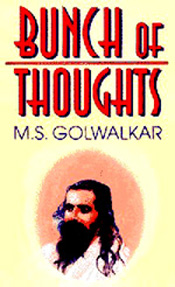|
Introduction
Bunch Of Thoughts
M.S. Golwalkar
Part Two - The Nation And Its Problems
XI. For A Virile National Life *

Nation, a positive concept-What modern scholars say-Hindu child of Bharat-Community of culture, history, etc.-Hence, Hindu Nation-Non Hindus and test of nationality-Not nurture but culture counts-Call to non-Hindus-Revive spirit of assimilation-Non-Hindu in Hindu Rashtra-Basis for national integration.
Dr. Keshav Baliram Hedgewar, founder of the Rashtriya Swayamsevak Sangh, was from his early boyhood intensely devoted to the cause of nation and was in the thick of the various movements going on at that time for the liberation of our motherland. He was engrossed for several years in the revolutionary movement. He later on plunged into the agitations and organisational work of the Indian National Congress.
But soon he discovered that the underlying idea in all those movements was merely one of ousting the British. And that idea was equated with nationalism. For most of the leading men of those times, 'anti-Britishism' and 'nationalism' were interconvertible terms. Our founder felt dissatisfied with that superficial kind of thinking. He knew from a deep understanding of the history of our nation and also of other nations that the concept of 'nation' was a positive one and was not based on antagonism to anyone else. And he also knew that the slightest distortion in the initial concept of the national goal would, in spite of the best of intentions, ultimately lead us to irretrievable catastrophic results. Our fate would be like that of the person who started to make the idol of Vinayaka but ended by making a monkey:
fouk;da izdqokZ.kks jp;kekl okuje~A
It was after profound cogitation along these lines that Dr. Hedgewar decided to start the Rashtriya Swayamsevak Sangh on the basis of the correct and positive and abiding concept of our nationhood.
What, then, is that true concept of our nationality ?
Let us start with stating and analysing its concept as understood and practised in the modern would, as that would help us appreciate the subject in the present context.
Author : M. S. Golwalkar
|